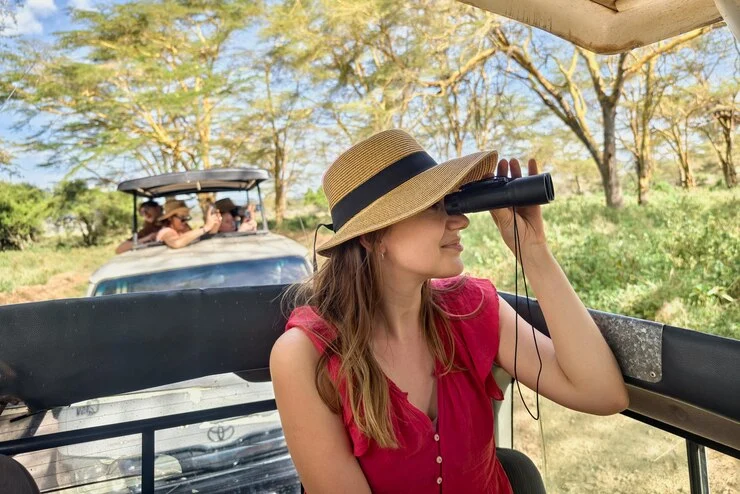Going on a safari is an exciting way to connect with nature and see incredible wildlife. It offers a unique experience. However, the African wilderness has its own rules. Certain actions can endanger you, other guests, and wildlife. Knowing what to avoid on safari will ensure a safe and enjoyable adventure.
Here are the most important dos and don’ts for safaris. These tips will help you prepare for an unforgettable journey into the wild.
Never Get Out of the Vehicle
One of the most important rules on safari is staying in your vehicle. Safari guides know the environment and the risks, which means they’ve mapped out safe zones. Getting out of the vehicle can provoke animals and potentially lead to dangerous encounters.
Don’t Wear Bright Colors
In the bush, blending in with the environment helps you see more wildlife without startling them. Wearing bright colors like red, yellow, or orange can make you stand out and may even provoke certain animals. Opt for neutral colors such as khaki, green, or brown to blend in better.
Avoid Making Loud Noises
Animals are highly sensitive to noise, and any sudden sound can scare them away or, worse, trigger defensive reactions. Avoid shouting, laughing loudly, or playing music. Speak softly and respect the quiet surroundings to enhance your wildlife sightings.
Never Feed the Animals
Feeding wild animals is harmful and dangerous. It disrupts their natural diet and can lead to aggressive behavior. Animals that grow accustomed to humans providing food may become a danger to themselves and to future safari-goers.
Don’t Leave Your Group
For safety, it’s essential to stay with your group at all times. Wandering off can put you at risk of getting lost or encountering wildlife alone. Safari guides are trained to keep the group safe and provide the best experience, so trust their expertise.
Don’t Forget to Dress Warmly
Temperatures can drop significantly, especially during early morning or evening safaris. Dress warmly to stay comfortable. This allows you to fully enjoy the experience without distractions from the cold. Layers are ideal, as you can adjust based on the temperature throughout the day.

Don’t Ask Your Guide to Take You to a Specific Animal
While you might be hoping to see lions, elephants, or other favorites, asking guides to find specific animals isn’t recommended. Wildlife sightings are unpredictable, and guides cannot control where animals will be. Trust their expertise to provide you with an authentic experience of the animals they do locate.
Don’t Yell When You Spot an Animal
Spotting a lion or elephant can be exciting, but yelling out can scare the animals or cause them to retreat. Keep a calm demeanor and let everyone in the group enjoy the moment quietly. Whispering will help maintain a natural environment where animals feel unthreatened.
Don’t Expect the Animals to Adjust to a Better View for You
Animals will not stop and pose for the camera. Be patient and take photos as they come. Trying to maneuver for a “perfect shot” can lead to disturbances. Respect their space, and remember that observing them naturally is a privilege.
Don’t Even Joke About Hunting
Hunting is a sensitive topic, especially in conservation areas where protecting animals is a priority. Making jokes about hunting can be offensive and disrespectful to guides and conservationists. Approach the experience with respect for the purpose of preserving wildlife.
Don’t Forget That Animals Are Dangerous
Even if animals look calm, they are still wild and can be unpredictable. Avoid making assumptions about their behavior. This is one of the most important things to remember on safari. Animals can be dangerous.
Don’t Go on a Self-Drive
While some parks offer self-drive options, going without a guide can be risky. Guides have a deep understanding of animal behavior and know how to handle unexpected encounters. A guided safari not only keeps you safe but also enhances your experience with knowledgeable insights.
Conclusion: Enjoy the Adventure Responsibly
A safari is a unique experience that brings you close to some of the planet’s most incredible wildlife. By following these guidelines, you’re contributing to your safety and the well-being of the animals and their habitats. Remember, respect for nature is the key to a memorable and safe safari.
Taking these precautions seriously will help ensure that your safari is as safe as it is exhilarating. Know the things you should never do on safari. This knowledge prepares you for an unforgettable journey.









